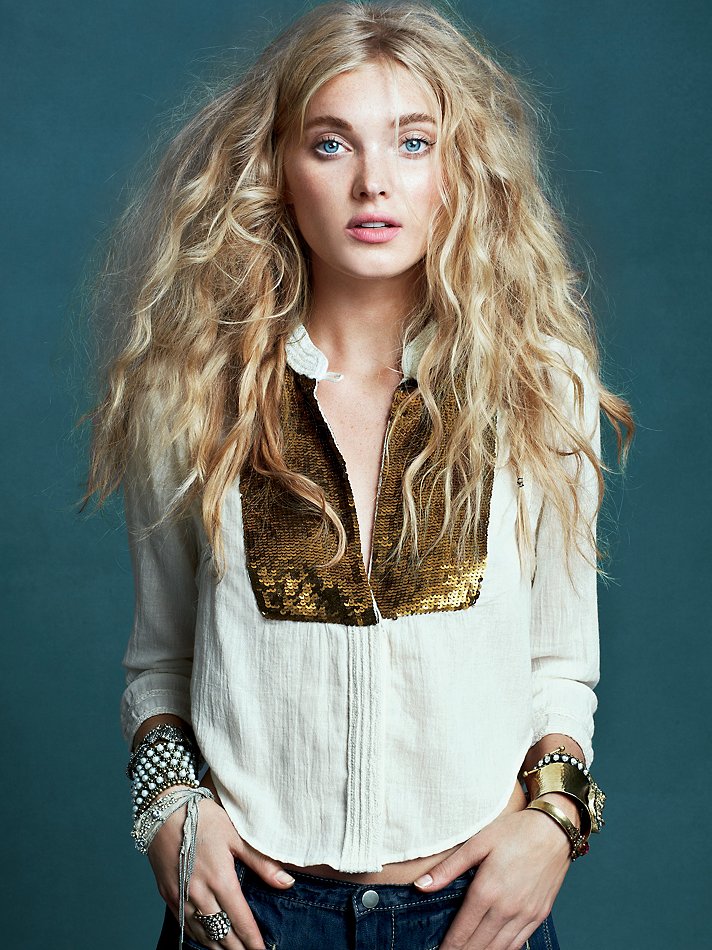We Burgundy Girls love playing with our locks, but are often a little lost on how to baby them. Enter Jamie Furie to the rescue. She works at Shampoo Hair Studio in Toronto's Kensington Market, and is our go-to guru on all things hair related. She's offered to very generously answer our questions – and not only that, but she'll answer yours too. So, if you've always been wondering how tame your mane, now's the time to ask.
 |
| via Free People |
Winter is a whole new ball game! I find my clients blowdry a lot more often (because Canadian winters plus wet hair equals mega badness). The plus side to this is that a nice blowdry means you can go a few extra days between washings and you don't have to worry about humidity ruining your 'do. I like to use mousse in dryer climates, like Alberta, where static becomes an issue in the winter, but in a damp, windy place like Toronto, a light gel will give you volume, retain shape, and protect your hair from the heat of a blowdryer. Keep in mind things like dry winter wind, touques, and wool scarves can cause a lot of dryness and breakage, not to mention mini dreadlocks at the nape of the neck. This is the time of year when you should start doing mini treatments on yourself: comb conditioner through damp hair, wrap it in plastic and let it sit for half an hour. The plastic will retain heat and allow your cuticles to open up and accept more of the conditioning molecules, then, as it cools, they clamp shut, locking in conditioner and leaving your hair smooth and shiny.
 |
| originally via We The People |
Does cutting your hair regularly help it grow?
I get asked this question on a daily basis and my response is yes and no. Obviously, cuts take away length but if you've decided you want a mane of long, healthy hair, it is imperative that you trim off those dry, dead split ends. When you brush your hair, the dry ends will break off, meaning instead of the 1/4 inch splits that can be trimmed off every few months, you can lose an inch or more, depending on where your hair gets caught in the brush. It can make the already lengthy grow-out process way longer than it has to be. Hair typically grows at a rate of a 1/2 inch per month, so just think: in a six month span with two 1/4 inch trims, your hair will have grown 2 1/2 inches, while in six months without a trim, your hair will have grown 3 inches but have broken off an inch and a half or more, leaving you with just 1 1/2 inches of growth. And don't forget how much easier it is to style when splits are a non-issue.
I keep hearing about natural hair products being better for your hair. However, I often find they leave my hair feeling dry. Could you explain why this is and how I can keep my hair feeling as healthy as it does when I use non-natural products?
 |
| via Pinterest |
I really want to like organic products. I love the idea of using something "natural". However, I have yet to find a product line that works well. I'm going to lay some science on you: a shampoo molecule has two parts to it, a hydrophilic end and a lipophillic end. The lipophillic end, which is usually some sort of sulphide, attaches itself to oil and dirt on your scalp and follicles, and the hydrophilic end (combined with the kinetic energy of water running downwards) actually pulls the oil off your hair and down the drain. The problem with products that don't include sulphides (like most organics) is that they can leave a waxy residue behind, which can cause dryness and breakage, leave the hair feeling dull, and make it tricky to style.
If you decide to use organic products, I would strongly recommend doing a clarifying treatment every other week. Use a clarifying shampoo (something with rosemary or mint would be an ideal choice), put it on dry hair, and let sit for 5 minutes before you hop in the shower. This will help strip that residue off before before your hair has a chance to get damaged.
Ask Jamie your hair questions at heyburgundygirls [at] gmail.com
For more of my favourite hair images, check out my Pinterest board

Jamie, this is awesome! No more guilt about not using organic hair products.
ReplyDelete